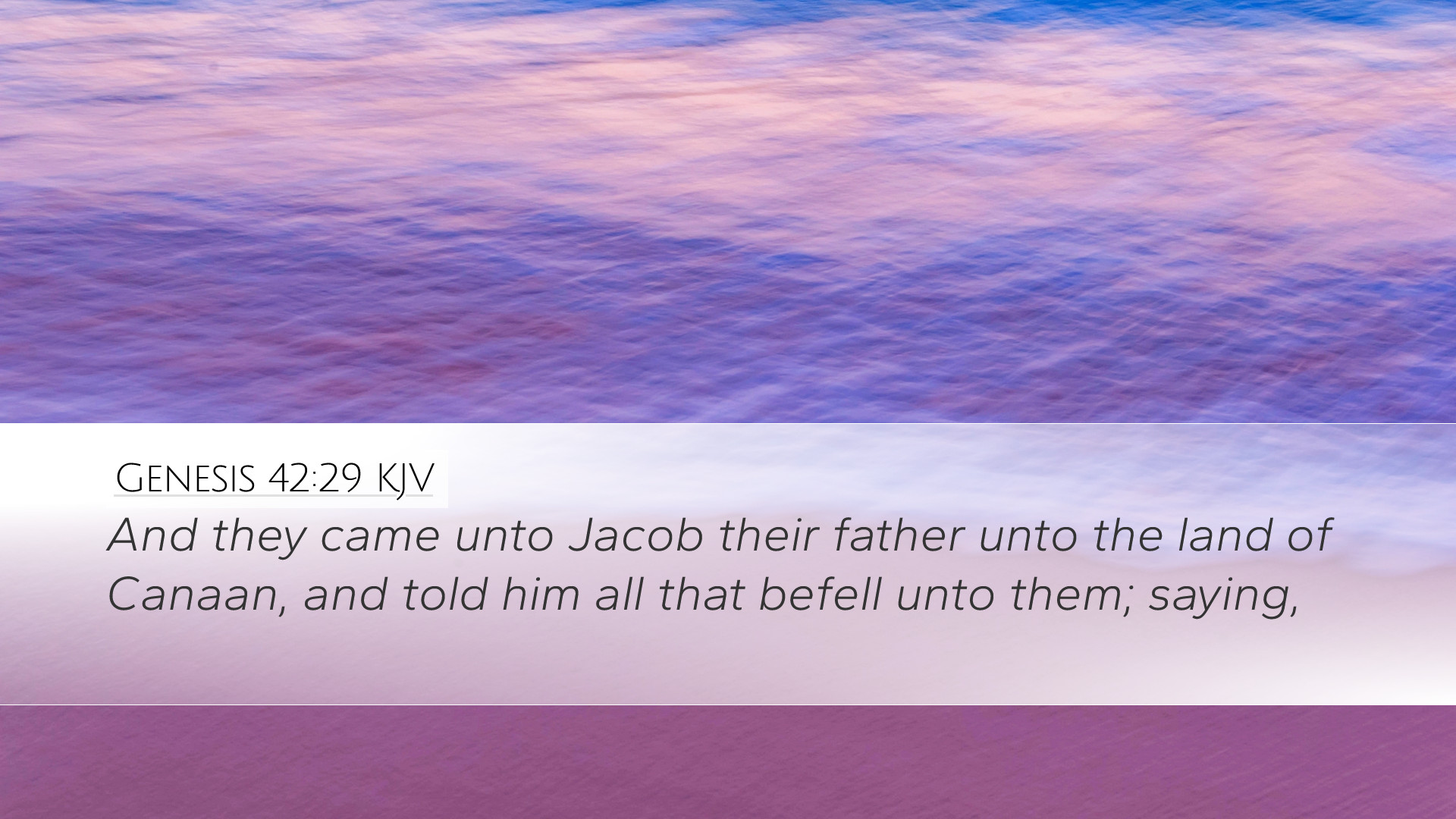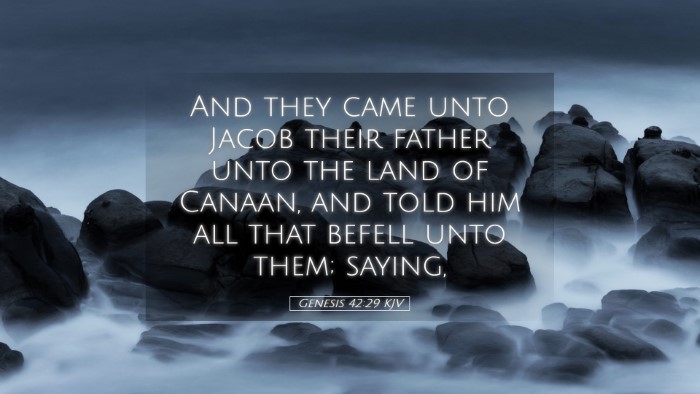Commentary on Genesis 42:29
Text of Genesis 42:29 (KJV): "And they came unto Jacob their father unto the land of Canaan, and told him all the things that befell unto them; saying,
Introduction
This passage is pivotal in the narrative of Joseph's story, especially as it marks the moment of revelation and familial tension. The return of Joseph's brothers to their father Jacob serves as a fulcrum around which themes of reconciliation, deception, and divine providence turn. In the context of this commentary, we will draw from the insights of noted biblical scholars and commentators to explore the implications of this verse.
Context and Setting
Before diving into the specifics of Genesis 42:29, it is crucial to understand its context within the broader narrative. Joseph, sold into slavery by his brothers, has risen to prominence in Egypt. Several years of famine have struck the land, leading his brothers to Egypt in search of sustenance.
As they engage with Joseph, unbeknownst to them, they encounter the brother whom they betrayed. The events leading up to this chapter illustrate the tension of their guilt, the unfolding of God's plan, and the hope for redemption.
Insights from Matthew Henry
Matthew Henry notes the gravity of the brothers' report to Jacob. He emphasizes the familial dynamics and the emotional weight of their communication. Jacob, already bereaved by the presumed loss of Joseph, receives news that shatters his understanding of their circumstances.
- Tension of Revelation: The brothers explain their experiences, including the severity of the Egyptian governor (Joseph) and the accusation of being spies. Henry highlights their downcast spirits as they bear news that they fear will further distress their father.
- Parental Concern: Jacob’s reaction is underscored, as he ponders the implications of losing another son (Simeon is held captive). This reflects the psychological and emotional burden parents bear for their children.
Insights from Adam Clarke
Adam Clarke delves into the significance of the brothers' narrative strategy as they recount their misadventures in Egypt. Clarke emphasizes that they fully disclose the gravity of their situation, laying bare the tensions that arise from their past guilt.
- Honesty vs. Deception: Clarke points out that the brothers, even in their retelling, cannot escape their past sins. Their honesty—uncharacteristic given their prior deception towards Jacob—signals a shift in their moral compass, largely influenced by their encounter with Joseph.
- Divine Intervention: Clarke notes that this moment of truth reflects God's handiwork in their lives, where their previous iniquities are brought back to the forefront of their minds to elicit repentance.
Insights from Albert Barnes
Albert Barnes focuses on the emotional narrative elements that are pivotal to understanding the dynamics at play in Jacob’s family. He identifies several key themes within the text that are essential for theological reflection.
- Family as a Microcosm: Barnes posits that the family unit in Genesis serves as a vital microcosm of larger theological themes, including the idea of suffering and redemption that runs throughout the Bible.
- Parental Grief: Highlighting Jacob's mourning, Barnes draws attention to the impact of loss within families, echoing the motif of separation that permeates human experiences and the necessity of reconciliation and healing.
Theological Implications
The theological ramifications of Genesis 42:29 are immense. The verse sets up a tension that anticipates the eventual reconciliation that is to come. From a pastoral perspective, this passage serves as a reminder of God's redemptive work in families and relationships marred by sin and strife.
- Hope amidst Despair: This account reminds us that God operates within the context of human fallibility. Even in their failures, the brothers' return to Jacob signifies the hope of restoration.
- The Role of Guilt: This passage encourages reflection on the weight of guilt and how it influences our actions and relationships. As seen through the brothers' report, transparency fosters healing.
Conclusion
In conclusion, Genesis 42:29 serves as a poignant intersection of narrative, theology, and psychology. Through the insights garnered from the commentaries of Matthew Henry, Adam Clarke, and Albert Barnes, we see a complex interplay of familial relationships and divine providence. This passage challenges pastors, students, theologians, and Bible scholars to consider the implications of their own narratives and the ways in which God invites us toward reconciliation and grace.


